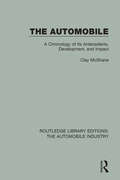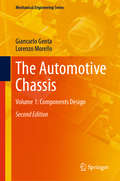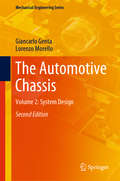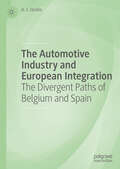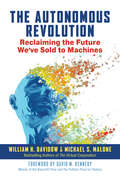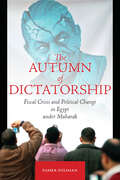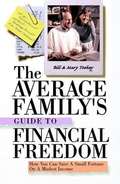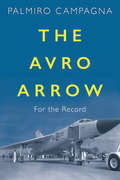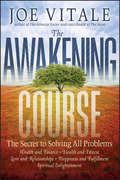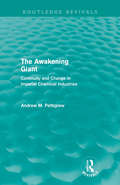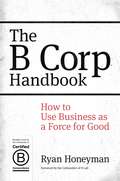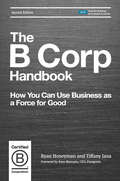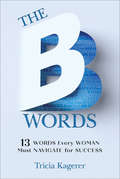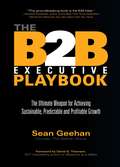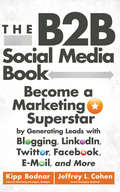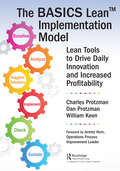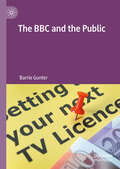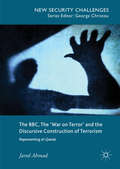- Table View
- List View
The Automobile: A Chronology of Its Antecedents, Development, and Impact (Routledge Library Editions: The Automobile Industry)
by Clay McShaneOriginally published in 1997 and now re-issued with some updated material, this chronology lists the major events in the history of the automobile. The automobile cannot be understood without knowing about its pre-history, including technologies such as railroads, carriages and trolley cars. Material on these is included to the extent that they represented preludes to the modern car culture. The volume also includes material about the technology, design and production of cars and their manufacturers. The ancillary fields of oil production and refining and road building are also covered. Focussed mainly, but not exclusively on the USA this chronology discusses the car and its role in social, geographical and political change.
The Automotive Chassis: Volume 1: Components Design (Mechanical Engineering Series)
by Giancarlo Genta Lorenzo MorelloThis textbook draws on the authors’ experience gained by teaching courses for engineering students on e.g. vehicle mechanics, vehicle system design, and chassis design; and on their practical experience as engineering designers for vehicle and chassis components at a major automotive company.The book is primarily intended for students of automotive engineering, but also for all technicians and designers working in this field. Other enthusiastic engineers will also find it to be a useful technical guide.The present volume (The Automotive Chassis – Volume 1: Component Design) focuses on automotive chassis components, such as:• the structure, which is usually a ladder framework and supports all the remaining components of the vehicle;• the suspension for the mechanical linkage of the wheels;• the wheels and tires;• the steering system;• the brake system; and• the transmission system, used to apply engine torque to the driving wheels.This thoroughly revised and updated second edition presents recent developments, particularly in brake, steering, suspension and transmission subsystems. Special emphasis is given to modern control systems and control strategies.
The Automotive Chassis: Volume 2: System Design (Mechanical Engineering Series)
by Giancarlo Genta Lorenzo MorelloThis textbook draws on the authors’ experience gained by teaching courses for engineering students on e.g. vehicle mechanics, vehicle system design, and chassis design; and on their practical experience as engineering designers for vehicle and chassis components at a major automotive company. The book is primarily intended for students of automotive engineering, but also for all technicians and designers working in this field. Other enthusiastic engineers will also find it to be a useful technical guide.The present volume (The Automotive Chassis – Volume 2: System Design) focuses on the automotive chassis as a system, providing readers with the knowledge needed to integrate the individual components described in Volume 1 in a complex system that satisfies customers’ expectations. Special emphasis is given to factors influencing system performance, including: - the influence of the powertrain on vehicle performance. Conventional, hybrid and electric powertrains are considered; - factors influencing vehicles’ handling performance; - factors influencing vehicles’ comfort performance; and - factors influencing vehicles’ stability and strategies for accident avoidance (active safety).In addition, this second volume thoroughly covers topics that are usually neglected in other books about the automotive chassis, such as: - the basics of vehicle aerodynamics; - internal combustion engines, electric motors and batteries; and - mathematical modeling tools.This thoroughly revised second edition has been updated to reflect the latest advances in electric and hybrid vehicles, electronic control systems and autonomous driving.
The Automotive Industry and European Integration: The Divergent Paths of Belgium and Spain
by A. J. JacobsThis book chronicles the divergent growth trends in car production in Belgium and Spain. It delves into how European integration, high wages, and the demise of GM and Ford led to plant closings in Belgium. Next, it investigates how lower wages and the expansion strategies of Western European automakers stimulated expansion in the Spanish auto industry. Finally, it offers three alternate scenarios regarding how further EU expansion and Brexit may potentially reshape the geographic footprint of European car production over the next ten years. In sum, this book utilizes history to help expand the knowledge of scholars and policymakers regarding how European integration and Brexit may impact future auto industry investment for all EU nations.
The Autonomous Revolution: Reclaiming the Future We’ve Sold to Machines
by Michael S. Malone William H. DavidowThe coauthors of the seminal book The Virtual Corporation describe how the rise of artificial intelligence and virtual environments are ushering in an epic cultural transformation—and how we can thrive in this new era.We are at the dawn of the Autonomous Revolution, a turning point in human history as decisive as the Agricultural and Industrial Revolutions. More and more, AI-based machines are replacing human beings, and online environments are gathering our data and using it to manipulate us. This loss of human autonomy amounts to nothing less than a societal phase change, a fundamental paradigm shift. The same institutions will remain—schools, banks, churches, and corporations—but they will radically change form, obey new rules, and use new tools. William H. Davidow and Michael S. Malone go deeply into the enormous implications of these developments. They show why increases in productivity no longer translate into increases in the GDP and how zero cost, one-to-many communications have been turned into tools for cybercrime and propaganda. Many of the book's recommendations—such as using taxes to control irresponsible internet behavior and enabling people to put their data into what are essentially virtual personal information "safety deposit boxes"—are bold and visionary, but we must figure out how we will deal with these emerging challenges now, before the Autonomous Revolution overcomes us.
The Autumn of Dictatorship
by Samer SolimanSoliman (political economy and political science, American U. in Cairo, Egypt) conducts a political-economic analysis of the regime of the recently ousted Hosni Mubarak, who ruled Egypt for 30 years until the Egyptian popular uprising of 2011. His central argument, influenced by both Marx and Weber, focuses on state finances. It distinguishes between the regime and the state and argues that Mubarak's political authoritarian rule systematically weakened the state, leading to fiscal crisis in which declining revenues from oil, the Suez Canal, and foreign aid prompted the growth of independent economic centers of power and consequent political shifts empowering a rising bourgeoisie who are contesting the power of the old ruling bureaucracy represented by Mubarak. Annotation ©2011 Book News, Inc. , Portland, OR (booknews. com)
The Average Consumer in Confusion-based Disputes in European Trademark Law and Similar Fictions
by Rasmus Dalgaard LaustsenThis book contends that, with regard to the likelihood of confusion standard, European trademark law applies the average consumer incoherently and inconsistently. To test this proposal, it presents an analysis of the horizontal and vertical level of harmonization of the average consumer. The horizontal part focuses on similar fictions in areas of law adjacent to European trademark law (and in economics), and the average consumer in unfair competition law. The vertical part focuses on European trademark law, represented mainly by EU trademark law, and the trademark laws of the UK, Sweden, Denmark and Norway. The book provides readers with a better understanding of key aspects of European trademark law (the average consumer applied as part of the likelihood of confusion standard) and combines relevant law and practices with theoretical content and other related areas of law (and economics). Accordingly, it is an asset for policymakers and practitioners, as well as general readers with an interest in intellectual property law and theory.
The Average Family's Guide to Financial Freedom
by Bill Toohey Mary TooheyA practical guide for an American family towards financial freedom using sensible, realistic, logical, and reasonable strategies.
The Avocado Debate (Changing Planet)
by Honor May EldridgeWhether smashed on toast or hailed as a superfood, the avocado has taken the world by storm, but what are the environmental and social impacts of this trendy fruit? This book does not seek to demonise the avocado and its many enthusiasts. Instead, it will illuminate consumers on the often unseen impacts of foods. A staple of cafes, restaurants, homes, and social media channels, demand for the avocado has grown exponentially over the past thirty years. From an everyday crop in South and Central America to a global phenomenon, this drastic change in demand has many consequences for people and the planet. As demand grows, so does the need for more land, with land clearances threatening habitats and biodiversity. As production grows, so does global distribution and the impacts that air and sea travel have on the environment. The shift from a local to a global product disturbs the local food system, raising serious questions around food sovereignty and food justice and the importance of establishing an agricultural system that is both environmentally and socially just. While focusing here on the avocado, this book allows readers to gain a better understanding of the food system as a whole. In doing so, it empowers us all to think carefully and critically about the environmental and ethical implications of our food choices more broadly. We shouldn’t feel guilty about eating avocados, we should simply understand the impact of doing so. This book is essential reading for all who are interested in learning more about the food system, sustainable diets, and the relationship between farming and the environment.
The Avro Arrow: For the Record
by Palmiro CampagnaDeclassified government records shed additional light on the cancellation and subsequent destruction of the Avro Arrow. The controversial cancellation of the Avro Arrow — an extraordinary achievement of Canadian military aviation — continues to fire debate today. When the program was scrapped in 1959, all completed aircraft and those awaiting assembly were destroyed, along with tooling and technical information. Was abandoning the program the right decision? Did Canada lose more than it gained? Brimming with information to fill in gaps in the Arrow’s troubled history, and with an update on the latest search for the scale models launched deliberately into Lake Ontario as part of the test program, The Avro Arrow tackles the outstanding questions head on.
The Awakened Millionaire: A Manifesto for the Spiritual Wealth Movement
by Joe VitaleThe Awakened Millionaire is a practical manifesto guiding you to new dimensions of personal wealth, spiritual growth, and as a result, global transformation. Crafted by Dr. Joe Vitale, a famed millionaire, best-selling author, and star of the blockbuster movie "The Secret," you'll discover a controversial formula that accomplishes what few believe possible: combining money and spirituality together to bring you more of both, while transforming you into a force for good in a world that desperately needs it. This book is a call to action, pushing you to wake up, stand up, and transform yourself into a powerful expression of your passion, your wealth, and your desire to make a difference. It is an invitation to become a true Awakened Millionaire, starting today. While most consider money and spirituality a blasphemous duo, Dr. Vitale shatters these social norms and shows you the true nature of money empowered with soulful purpose. At turns inspirational, motivational, and conversational, this page-turner ultimately narrows in on practical steps anyone can use to see instantaneous results, regardless of your past failures, current financial situation, or future goals. But his mission is not to simply transform you. Dr. Vitale's mission is to create a swarm of Awakened Millionaires transforming the world with every action they take, while enjoying personal luxury and soulful fulfillment new levels of money and spiritual growth can give them.
The Awakening Course: The Secret to Solving All Problems
by Joe VitaleThe complete mind, body, and spiritual transformation based on a highly successful course--now in paperback!The Awakening Course is Joe Vitale's most recent breakthrough program explaining the four stages of awakening. This thought-provoking book builds on everything Vitale has written and recorded to date, taking you to a whole new level of personal and professional transcendence.This book offers a proven step-by-step approach for finding and achieving your goals and desires through a complete mind, body, and spiritual transformation.Discover new perspectives on money, role models, and the power of your unconsciousRe-state complaints into positive life-changing intentions, and turn your fears into a catalyst for success5 steps for attracting anything or anyone into your lifeJoe Vitale is the author of the bestselling The Attractor Factor and The KeyLet The Awakening Course take you to a place of transcendence.
The Awakening Giant: Continuity and Change in Imperial Chemical Industries (Routledge Revivals)
by Andrew PettigrewFirst published in 1985, this book is about Imperial Chemical Industries’ response to the changing social, political, business and economic environment over the past twenty years. Using personal interviews and archival material, Andrew Pettigrew examines the evolution of business strategy, organisation structure and culture, technology and union-management relations within this corporate giant over an extended period of time. It is a compelling account, told from the inside, by one of the world’s leading management and organisation theorists. The Awakening Giant has made a major practical and theoretical contribution to the study of corporate strategy, organisational analysis and change, and business history. Anyone with an interest in managing change in a large corporation will find this reissue rewarding reading.
The Axiomatics of Economic Design, Vol. 1: An Introduction to Theory and Methods (Studies in Choice and Welfare)
by William ThomsonThis textbook is Volume 1 of a two-volume set on the axiomatics of economic design. Its central argument is that economic institutions are not God-given: they are man-made. Their ultimate goal is to promote social welfare. The book describes the axiomatic approach to design. It consists in the formulation of criteria of desirability of solution mappings, and of the examination of their logical implications when imposed in various combinations. Its goal is to identify as precisely as possible the line that separates those combinations of desiderata that are compatible and those that are not. The end product of axiomatic work are menus of choices for practitioners to choose from when they have to make a decision.The first volume offers pedagogical coverage of the axiomatic approach to economic design, in the form of answers to questions posed by a young person curious about it. It introduces readers to what motivates economic design. It continues with the mathematical representation of a class of allocation problems. The bulk of the volume is to present structured inventories of the field of axioms, arranged by format first, and content next. These chapters are followed by a user's manual on the axiomatic method. Lastly, the volume discusses how economic design can be aided by other disciplines, in particular philosophy, mathematics, and computer science.
The Aztec Economic World
by Kenneth G. HirthThis study explores the organization, scale, complexity, and integration of Aztec commerce across Mesoamerica at Spanish contact. The aims of the book are threefold. The first is to construct an in-depth understanding of the economic organization of precolumbian Aztec society and how it developed in the way that it did. The second is to explore the livelihoods of the individuals who bought, sold, and moved goods across a cultural landscape that lacked both navigable rivers and animal transport. Finally, this study models Aztec economy in a way that facilitates its comparison to other ancient and premodern societies around the world. What makes the Aztec economy unique is that it developed one of the most sophisticated market economies in the ancient world in a society with one of the worse transportation systems. This is the first book to provide an updated and comprehensive view of the Aztec economy in thirty years.
The B Corp Handbook
by Bart Houlahan Jay Coen Gilbert Andrew Kassoy Ryan HoneymanJoin a Growing movement: Learn how you can join a fast-growing global movement to redefine success in business--led by well-known icons like Patagonia and Ben & Jerry's as well as disruptive upstarts like Warby Parker and Etsy--recently covered by the New York Times, the Economist, the Wall Street Journal, Entrepreneur, and Inc. Build a better business: Drawing on best practices from 100+ B Corps, this book shows that using business as a force for good can help distinguish your company in a crowded market, attract and retain the best employees, and increase customer trust, loyalty, and evangelism for your brand. More than 1,000 companies from 80 industries and 30 countries are leading a global movement to redefine success in business. They're called B Corporations--B Corps for short--and these businesses create high-quality jobs, help build stronger communities, and restore the environment, all while generating solid financial returns. Author and B Corp owner Ryan Honeyman worked closely with over 100 B Corp CEOs and senior executives to share their tips, advice, and best-practice ideas for how to build a better business and how to meet the rigorous standards for--and enjoy the benefits of--B Corp certification. This book makes the business case for improving your social and environmental performance and offers a step-by-step "quick start guide" on how your company can join an innovative and rapidly expanding community of businesses that want to make money and make a difference.
The B Corp Handbook, Second Edition: How You Can Use Business as a Force for Good
by Ryan Honeyman Tiffany Jana"This book shows how using business as a force for good, not just pursuing short-term profits, can be better for consumers, employees, local communities, the environment, and your company's long-term bottom line."—Tony Hsieh, New York Times bestselling author of Delivering Happiness and CEO, Zappos.com, Inc. B Corps are a global movement of more than 2,700 companies in 60 countries—like Patagonia, Ben & Jerry's, Kickstarter, Danone North America, and Eileen Fisher—that are using the power of business as a force for good. B Corps have been certified to have met rigorous standards of social and environmental performance, accountability, and transparency. This book is the authoritative guide to the what, why, and how of B Corp certification.Coauthors Ryan Honeyman and Dr. Tiffany Jana spoke with the leaders of over 200 B Corps from around the world to get their insights on becoming a Certified B Corp, improving their social and environmental performance, and building a more inclusive economy. The second edition has been completely revised and updated to include a much stronger focus on diversity, equity, and inclusion (DEI). These changes are important because DEI can no longer be a side conversation—it must be a core value for any company that aspires to make money and make a difference.While this book is framed around the B Corp movement, any company, regardless of size, industry, or location, can use the tools contained here to learn how to build a better business. As the authors vividly demonstrate, using business as a force for good can help you attract and retain the best talent, distinguish your company in a crowded market, and increase trust in your brand.
The B Words: 13 Words Every Woman Must Navigate for Success
by Tricia KagererAn executive VP shares thirteen challenges women face in the workplace, their impact, and strategies for women to overcome them and achieve success.Navigating the workforce as a woman can feel like making your way through a minefield. Step too far in one direction, and suddenly, you’re considered bossy and overbearing and difficult to work with. Too far in the other, and you lose your power and voice. And if you try to stay in the middle, you could still be contributing to a long history of stagnant mind-sets that have hindered women from reaching true equality.In The B Words: 13 Words Every Woman Must Navigate for Success, Tricia Kagerer uses her experience and the experiences of other women to help women of all ages and in all walks of life achieve their goals. Kagerer identifies the challenges as —both internal and external—each as a different “B” word, that hold women back both personally and professionally, then explores their impact and outlines strategies for overcoming them. Whether that means navigating difficult relationships with coworkers, building effective professional networks, or confronting one’s own limiting beliefs and biases, Kagerer’s advice shows how we can break through these obstacles and find our way to self-defined success.This book fights for true equality in the workforce and calls for bridges to be built not only between women but between men and women as well, fostering open communication and understanding that will lead to a brighter future.Praise for The B Words“From balance and babies to badasses and bravery, this book packs a punch about living with intention.” —Sharon Orlopp, former Global Chief Diversity Officer, Walmart“The B Words is a great guide, not only for women just starting out, but also for those who have been in the business for years.” —Dr. Sally Spencer-Thomas, author & keynote speaker“A must-read for every male leader! Tricia is candid about the difficult situations women experience and rarely share.” —Jeffrey Tobias Halter, Corporate Gender Strategist & President, YWomen
The B2B Executive Playbook
by Sean GeehanThe first book completely focused on successfully running B2B, which is very different from B2C. The fate of a B2B lies in the hands of a few individuals so what ultimately determines if a company thrives, or even survives, is how these key relationships are targeted, structured and managed. Over 30 percent of all B2B product development, marketing, and other discretionary dollars are wasted. When the realities of B2B marketplace are not integrated into a company's SOP, it is more likely that the company is wasting money as well as the employees' time and efforts. If the budget and plans aren't structured for B2B specifically, they won't move the meter. But there is good news - there is a corresponding equal amount of potential revenue, growth and prosperity. The leading B2B companies dramatically build their top and bottom lines when leaders realize that success, undeniably and unquestionably, resides with how they engage with the their customers and how that will drive their internal alignment and operations. What is it that they are doing differently than their competition and others in their industry that drive revenue growth, deliver predictable earnings, retain and grow customers and develop new offerings that customers will not only buy, but for which they will pay premiums.
The B2B Social Media Book
by Kipp Bodnar Jeffrey L. CohenAdvance your B2B marketing plans with proven social media strategiesLearn social media's specific application to B2B companies and how it can be leveraged to drive leads and revenue. B2B marketers are undervalued and under appreciated in many companies. Social media and online marketing provide the right mix of rich data and reduction in marketing expenses to help transform a marketer into a superstar. The B2B Social Media Book provides B2B marketers with actionable advice on leveraging blogging, LinkedIn, Twitter, Facebook and more, combined with key strategic imperatives that serve as the backbone of effective B2B social media strategies.This book serves as the definitive reference for B2B marketers looking to master social media and take their career to the next level.Describes a methodology for generating leads using social mediaDetails how to create content offers that increase conversion rates and drive leads from social mediaOffers practical advice for incorporating mobile strategies into the marketing mixProvides a step-by-step process for measuring the return on investment of B2B social media strategiesThe B2B Social Media Book will help readers establish a strong social media marketing strategy to generate more leads, become a marketing superstar in the eye of company leaders, and most importantly, contribute to business growth.
The BASICS Lean Implementation Model: Lean Tools to Drive Daily Innovation and Increased Profitability
by Charles W. Protzman III Daniel Protzman William KeenIn 2004 Charlie Protzman created The BASICS Lean Implementation Model, which covers the full spectrum of what is needed to be effective and successful at implementing a Lean System. The reader is taken through a step by step approach developed over the last 15 years, in the use and understanding of Lean tools, principles, and processes. The authors break down Lean concepts to their simplest terms to make everything as clear as possible for Lean practitioners. You will learn an integrated, structured, problem-solving approach identified by the acronym BASICS (Baseline, Analyze, Suggest Solutions, Implement, Check and Sustain). This methodology is combined with a proven business strategy to help ensure a successful and sustainable transformation of any organization. The BASICS approach produces "real" bottom line savings with 20% to 50% or more increases in productivity when compared to pure batching environments. As those who have read the book will tell you, this is not a theory book… but rather a book you can return to over and over again for reference, throughout your Lean journey.
The BBC and the Public
by Barrie GunterThis book examines the relationship between the public and the BBC in terms of public use of the BBC and their attitudes towards it. These audience research measures are being used as metrics to assess the value of the BBC to the UK public. Some of the attitudinal measures address perceptions of the BBC’s outputs and some examine public views about the way the BBC is funded and managed. The book has been written at a time when the BBC reached its centenary and also the mid-point of its latest Royal Charter period. At the time of writing, the government had begun a mid-term review of its performance as judged by its attainment of objectives set out in that Charter. The Secretary of State for Digital, Culture, Media and Sport at the time of the mid-term review had spoken and written openly about abolishing the TV licence fee and the introduction of a new funding model for the BBC that would be implemented in its new Royal Charter due to be enacted in 2027. Against this backdrop, this book examines public opinion about the funding of the BBC and then looks at changing media consumption habits and how these have affected patronage of the BBC’s outputs. “Ultimately, a decision must be taken about the kind of national broadcaster the UK – both is government and its citizens – would like to keep in the future. Changing the funding model without first defining what the BBC should do and how it should be structured and resourced to do it could result in a messy solution that satisfies and benefits no one.”
The BBC, The 'War on Terror' and the Discursive Construction of Terrorism: Representing Al-qaeda (New Security Challenges)
by Jared AhmadIn the years since the September 11th 2001 attacks, the al-Qaeda phenomenon has become one of the most written about, yet crucially misunderstood, threats of the 21st century. But despite the sheer volume of literature produced during the ‘war on terror’ period, few studies have sought to consider the way this entity has been represented within the news media. The BBC, the War on Terror and the Discursive Construction of Al-Qaeda addresses this significant gap in knowledge by providing an original and much needed assessment of the various strategies used to depict ‘al-Qaeda’, and thus make it meaningful for British television audiences. Drawing on the work of French philosopher Michel Foucault, and focusing on Britain’s most watched and trusted news programme, the BBC’s flagship ‘News at Ten’ bulletin, the book provides insight into both the visual and verbal nature of these representations and the way they have shifted over the course of a ten-year period, while also shedding light upon the broader political and social consequences of the BBC’s portrayals. In doing so, the book not only helps to develop a deeper understanding of the complexity of the BBC’s representations, and their various shifts and transformations, but also details the process through which ‘al-Qaeda’ has been pieced together from a range of cultural parts. And how, ultimately, the dominant mode of representation used to portray this entity is one that closely resembles Britain’s own, diverse multicultural ‘self’.
The BCPC Internet Strategy Team: Robin Rhee
by Amy C. Edmondson Laura R. FeldmanAccompanies The BCPC Internet Strategy Team: An Exercise and provides unique background information on one of the team members.
The BGIE Twenty (2019 version)
by Matthew C. Weinzierl Jeremy Friedman Vincent Pons Kristin E. Fabbe Reshmaan N. Hussam Alberto F. CavalloIndustry and Background Note
